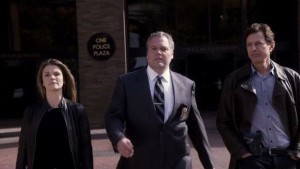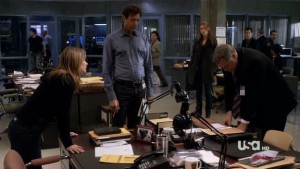Law & Order: Criminal Intent – “Loyalty” (Parts 1 & 2)
“Oh, it’s fun here.”
I held back on the review of the first episode of season 9 due to its two-parter nature, and that I didn’t have much to say beyond repeating the word “Exposition” 500 times (the minimum amount of words I like to supply for an entry). With the second part, the story comes into focus, as well as motivations for the departure of Goren and Eames.
As a way to hand the show over to Nichols and Stevens (the former’s new partner) the show does this oddly, with some degree of effectiveness. Ultimately what makes the episode (as I’ll treat the two-parter as a single episode) feel a bit off is the issue of jurisdiction, an issue that the episode grapples with as well.
Major Case Squad (MCS) handles high profile cases, local government officials and super-white collar murders. So while it handles the heavies of the heavies, that it gets involved in what is essentially a Somalian coup orchestrated on U.S. soil feels a little too big for the show’s britches, a little too distanced from the show’s ever present character: New York City.
To get into the unnecessarily grand plot, the show positions Ross as willing to help the FBI in a weapons smuggling operation that is being orchestrated by the FBI to get weapons with GPS locators to terrorists (yes, it’s very convoluted) (and shouldn’t the CIA be doing this?). This, of course, gets Ross killed since he’s spotted with his FBI handler. Exit Eric Bogosian. I always rather liked Ross: his exasperation at dealing with either quirky and brilliant (Goren and Nichols) or head strong and intuitive (Logan) was always a welcomed chuckle.
The remainder of the episode is spent essentially fighting turf wars with the FBI as Goren, Eames, and Nichols team up to figure out who killed Ross. Which results in another problem with the episode: as opposed to peeling back evidence or motivations or eliminating suspects with either of those, suspects are simply killed by the mastermind’s loyal chauffeur. Indeed, the only work the detects really have to do is wait for all the suspects to die, and that clears the way to get at Hassan.
A lack of solidly thought out procedural elements should provide plenty of room for engaging character beats, but those never really occur either. Goren is given the most obvious bits, as he accepts his suspension to lead his own investigation into Ross’ murder. The shift of having a super-intellectual cop like Goren become an outlaw investigator is a nice one, but not one that is ultimately given any real play. Part of this could be a runtime issue (if Goren had been suspended in the first episode…), but another could be the franchise’s emphasis on the value of the system, of the law being better than any outside, vigilante-esque justice. That emphasis, like Goren’s outlaw status, isn’t given enough time to breathe, weakening the overall tone of the episode.
Contrast this to Nichols’ desire, even to the very end, to follow the law and see justice done through it. He encourages Eames to check Goren’s alibi for when a suspect shows up dead, the feds don’t go snooping around Goren any more than necessary (thus allowing him to continue his own investigation). Eames is less than thrilled with the idea, since it conflicts with her personal feelings about Goren. But by the end, when the FBI weapons smuggling plot comes into the light, and will allow Hassan to be freed, despite having killed many people, Nichols wants Hassan to have that day in court, to have that form of justice delivered. That he ultimately agrees to allow Hassan to go, in memory of the work Ross believed in, is frustrating, but softened by his final confrontation with Hassan, where he reminds Hassan that assassination begats assassination.
The exits of Goren and Eames are handled perhaps better than any right they should be in this situation of mismashed ideas and jumbled procedural and character beats. Eames, due to Ross’ death, is eventually selected to head up MCS, with the sole purpose of being the one to fire Goren. Which she does. The moment is sweetly awkward as neither clearly knows what to do with each other, and Goren’s natural vulnerability comes to the forefront, climaxing with a boyish but loving kiss on Eames’ cheek. Eames resigns shortly there after. It’s a nice cap for the two characters, whose attraction for one another the show slowly unrolled. It was never the most natural, but it worked for the two characters.
The second half (part 2) provides a soft intro for Nichols’ new partner, Serena Stevens. I’m rather excited about Stevens based on this intro. One of the qualms with CI is that the secondary partners have felt more secondary than partners. They don’t hold up in terms of personality and knowledge to their headlining partners. Stevens very quickly establishes herself as someone who is not only smart (she reads Urdu!) but also pushes witnesses in the subtle ways that Eames and the various Team B partners (Bareck, Wheeler, Falacci) never seemed able to do without being very obvious about it. I like this potential between Nichols and Stevens, and am eager to see how it plays out.
FINAL THOUGHTS
- My favorite not-so-subtle moment was ME Rodgers’ lingering look at Ross’ grave site during the funeral, a good reminder, and possible confirmation, of her relationship with Ross.
- I’m a bit disheartened that David Zayas, who played Lt. Stanley Maas, the interm head of MCS, won’t be back as I was enjoying his work. But I guess he must return to Dexter.
- The episode was also marked by a complete lack of a decent interrogation scene, a staple of the show. Again, it’s what happens when your plot is too big and you keep killing suspects. Nichols and Stevens pushing Hassan’s sister was good, but not nearly as satisfying.
- April 8, 2010
- Noel
- Episode Review
- Law & Order: Criminal Intent



